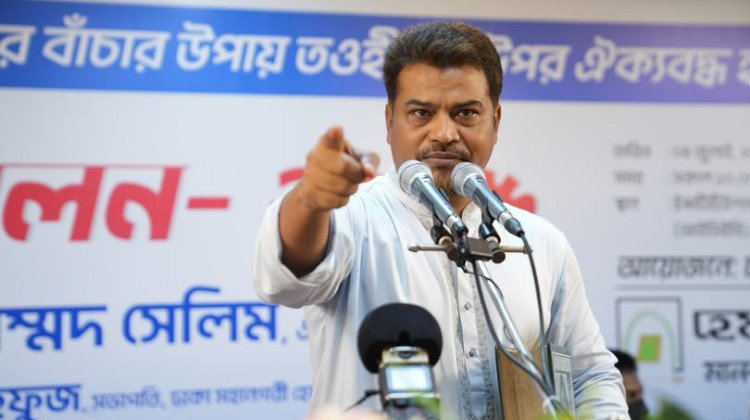Unemployment: A Product of the Education System
Category :
Education Crisis & Youth Unemployment

Author ::
Salzar Rahman Sabu
Jan 28, 2026
visibility
670 Read
The original purpose of English education was to create a clerical workforce necessary to run colonial administration. It hardly needs explaining what a blunder it is to try to turn an entire nation into clerks.
Yet, even after the British left, we have continued with that same education system, producing an overwhelming number of clerks—which has led to a massive unemployment crisis in our country (and similar countries). We are drowning in that crisis.
Even before we can create new jobs, hundreds of thousands of new clerks are graduating and entering the workforce. The nation is struggling under the weight of these educated unemployed individuals. Uneducated people are rarely unemployed, as they do not hesitate to engage in physical labor.
But when someone collects one or two certificates, they can no longer be employed in manual labor. Their surroundings and mindset become a towering wall, higher than the Himalayas, that blocks their path.
One of the primary goals of education is the development and advancement of human resources. But the education system we currently have does not meet the needs of the times—much less the needs of the intellect. Instead of being a vehicle for progress, the existing system has become a burden to society.
No matter how much we glorify our education, we have not made significant progress. The colonial education system that once at least served the British has lost even that minimal relevance in independent Bangladesh. This is not just unfortunate—it is shameful.
According to the 2023 Quarterly Labour Force Survey by the Bangladesh Bureau of Statistics, the total labor force in the first quarter of 2024 was 73.7 million. By the end of that quarter, the number of unemployed had risen to 2.59 million, up from 2.35 million in the previous quarter (October–December 2023). That’s an increase of 240,000 unemployed in just three months (Bangla Tribune, May 6, 2024).
This trend of rising unemployment continues in Bangladesh. What is most alarming is the situation of the highly educated. The 2022 full report by the Bureau of Statistics states that 12% of university graduates are unemployed. By 2023, the number of unemployed graduates had doubled in five years, reaching 800,000. A pre-COVID ILO report showed that among 28 Asia-Pacific countries, Bangladesh had the second-highest rate of educated unemployment—just behind Pakistan.
According to the Bangladesh Institute of Development Studies (BIDS), the overall unemployment rate is 3.6%, while youth unemployment accounts for nearly 80% of that. As a result, for every job opening, applicants with higher qualifications than required often apply. For example, between December and March 2024, Bangladesh Railway hired 2,172 waymen in two phases—a fourth-grade job involving physically demanding tasks such as track maintenance. The required qualification was SSC or equivalent, yet most of those hired had Master’s degrees.
Moreover, due to a lack of moral education, many Bangladeshis have lost or are losing job opportunities in the Middle East (Bangladesh Economic Association). A report by The Economist Intelligence Unit (London-based) states that Bangladesh has the highest rate of graduate unemployment in South Asia—47%. That means 47 out of every 100 university graduates are unemployed.
Everyone would agree: the unemployment of an educated person cannot be equated with that of an uneducated one. The investment made by the state, family, and society is wasted if it produces no return.
According to newspapers, 2.2 million people enter the labor market every year. But only 700,000 find jobs. The remaining 1.5 million become a burden on the nation. It is important that every citizen is educated—but more important is the proper utilization of that educated population.
If we cannot provide employment to the millions entering the workforce each year, not only does social unrest increase, but crime rates also spiral out of control.
According to a July 1, 2012 report in Amar Desh, Mohammad Ibrahim, a researcher from the Bangladesh Economic Association, stated that due to our flawed education system, the number of educated unemployed is rising every day.
The outdated system produces clerks, not skilled manpower. Another researcher, Mohammad Abdullahil Baki Billah, observed that as education rates increase, so does unemployment. The higher pass rates have only increased joblessness.
The research identifies the main cause of educated unemployment as the existing general education system. Every year, 400,000 students pass the postgraduate exams, most of whom hope for a job and remain unemployed for 6–7 years.
They fail to develop specialized skills and often end up working abroad under people who have only passed high school. After finishing their general education, they are given no guidance about what kind of jobs they might be fit for. The lack of job counseling in institutions means students are unaware of their actual capabilities.
This educated middle class has been a headache for the nation since British rule. In the 19th century, the introduction of English education created this class. Describing the mindset of this group, Promothnath Bishi wrote in 1948:
"A middle class quickly formed in Bengal. This class was both the achievement and the curse of British rule—its rise and its downfall. The British ruled with the help of this clerk-based middle class, but eventually, this very class, disillusioned with colonialism, pulled the first brick from the imperial throne. Most Bengali revolutionaries were from this middle class."
Now, the situation has changed. The middle class has lost its respect and influence. With the expansion of industrial machinery, their relevance is dwindling. This middle class remains a special problem in Bengal—millions of educated, capable, yet now helpless and frustrated individuals.
They once helped establish colonial rule, illuminated Bengali culture, and rebelled against imperialism. Now they are exhausted and almost incapable of earning a living—like demobilized soldiers, wandering helplessly. Authorities see them as unwanted, the masses see them as excess, and they see themselves as cursed. If a proper solution for this middle class is not found, they will not allow peace in society, and their unrest may once again shake the foundations of governance.
Promothnath Bishi continued:
"Today’s predicament has its roots in the schools of Hare and the classrooms of Hindu College. Back then, knowing English meant guaranteed employment. A British officer would personally call for you. Someone would say ‘Let me ask my mother,’ another would say ‘I’ll do it if it’s like my father’s job,’ and some would say their mothers won’t let them go to a land beyond the Ganges.
Then, the employers chased the job-seekers. Today, even if one swallows the English Channel, not even a security guard will look your way. The solution of that era has become the crisis of today."
The term “kerani” (clerk) symbolizes mediocrity, subservience, and lack of creativity. In the British era, without photocopiers, clerks used to copy documents by hand—thus the English term “writer” became associated with them. The secretariat in Kolkata is still called the Writers’ Building. There’s an old story about a clerk who was copying a document when he came across a dead fly stuck to a word, making it illegible.
He spent three days trying to kill a similar fly, and finally pasted it in the same spot to make a perfect copy—hence the Bengali proverb “machhi mara kerani” (the fly-killing clerk), meaning someone doing useless work. This was cited in an article by Krishanu Bhattacharya.
Even surveys were done on clerks during the British era! The famous civil servant, journalist, writer, and British advisor William Hunter conducted such a study. In 1870, Bengal had 10,247 clerks, which grew to 16,315 by 1881, and to 18,950 after another decade. This ever-growing number likely gave rise to the stereotype of the "clerk mentality" among Bengalis.
In 1886, Hunter became Vice Chancellor of Calcutta University and president of the Education Commission. His most famous book “The Indian Musalmans” was dedicated to Mr. Hudson, who once gifted 29 severed heads of children from the Mughal palace to the old emperor Bahadur Shah Zafar.
Let’s return to the main point. The term kerani to us symbolizes petty insignificance. A kerani means subordinate, dependent, unthinking. He has no right to opinions or awareness. He merely obeys. Maulana Abdul Hamid Khan Bhashani used to call the American ambassador “America’s kerani” and refused to sit in talks with him.
He once said: “What’s there to discuss with a kerani?” When invited to a meeting, he declined, saying clerks of foreign powers have no say in the matters of a sovereign nation—a bold declaration from a patriotic, free-spirited leader.
But today’s national leaders have become so spineless that they endlessly flatter British and American ambassadors. Before elections, political leaders present their blueprints for governance not to the people, but first to these foreign ambassadors (Manabzamin, 13/08/13), because they believe their fate lies in the hands of Western diplomats.
Images Related to this Post
Related Post
Search
Popular Post
Recent Post
Tags
Hezbut_Tawheed
Imam Hossain Mohammad Salim
Bangladesh Violence
Religious Extremism
Mob Attacks
Human Rights Violations
Minority Persecution
Rangpur Attacks
Jamaat-E-Islami
Hefazat-E-Islam
Tawheed
Muslim Ummah
Islamic Unity
Shirk
Kufr
Islamic Revival
Kalima-E-Tawheed
Obedience To Allah
Deen-Ul-Haq
Hizb-Ut-Tawheed
Ram Temple
Third Temple
Ayodhya
Jerusalem
Religious Politics
Babri Masjid
Al-Aqsa
Zionism
Hindutva
Netanyahu
Religious Hate
Muslim Unity
Noakhali Conference
Imam Salim
Islamic Movement
Shahidi Jame Mosque
Ht Members Conference
Bangladesh Religious Persecution
Islamic Reform Movement
Extremist Violence
Human Rights Bangladesh
Sonaimuri Noakhali Attack
Political Extremism Bangladesh
Faith-Based Violence
Eid Al‑Fitr
Zakat Al‑Fitr
Ramadan Charity
Islamic Social Justice
Community Harmony
Bangladesh Poverty
Islamic Economy
Sadaqah
Fitrana
Eid Unity
Arab History
Islamic Governance
Caliph Umar
Social Transformation
Women’s Rights In Islam
Justice In Islam
Political Systems
Islam Vs Democracy
Islam And Knowledge
Islamic System
Prophet Muhammad
Farewell Sermon
Hajj
Global Peace
Human Rights In Islam
Dhul-Hijjah
Arafat Sermon
Islam Vs Un Charter
Unemployment In Bangladesh
Education System Failure
Educated Unemployment
Jobless Graduates
British Education Legacy
Youth Crisis
Hezbut Tawheed Views
Bids Report
Ssc To Masters Job Race
Middle Class Dilemma
Kerani Mentality
Excessiveness In Religion
Religious Distortion
Overinterpretation Of Islam
Misguided Enthusiasm
Warnings Of The Prophet
True Islam
Spiritual Clarity
Abandoning The Mission
Chormonai Pir
Desherpotro
Islamic Reform
Persecution In Bangladesh
Religious Violence
Jamaat-E-Islami Attacks
Islamic Truth Movement
Women And Knowledge
Islamic Feminism
Gender Roles
Social Awareness
Muslim Women
Female Empowerment
Islamic History
Qur’anic Guidelines
Obeying Allah’s Commands
Islam And Suffering
Workers' Rights In Islam
Labor Justice
May Day Islam
Islamic Society Model
Chashirhat Development
Imam Hossain Mohammad Selim
Islamic Brotherhood
Fair Wages
Islamic Military Strategy
Tawheed-Based State
National Security
Qur’anic Warfare
Mujahideen
Peacekeeping
Modern Islamic Army
Military Training
Ummah Defense
Sharia Governance
Southasia
Extremism
Bangladesh
India
Pakistan
Myanmar
Jihad
Islamophobia
Radicalism
Resistance
Conflict
War
Terrorism
Proxywar
Bjp
Hasina
Ghazwa
Kashmir
Rohingya
Arsa
Militancy
Ideology
Unity
Awareness
Injustice
Arms
Geopolitics
Gaza
Hypocrisy
Taliban
Alqaeda
Afghanistan
Syria
Iraq
America
China
Russia
Media
Violence
Oppression
Nationalism
Muslim
Islam
Justice
Youth
Leadership
Sovereignty
Hezbuttawheed
Mosque
Governance
Society
Administration
Education
Military
Economy
Women
Culture
Law
Quran
Hadith
Prayer
Madinah
Baytalmal
Amir
Discipline
Khutba
Transparency
Spirituality
Training
Morality
Ummah
Prophet
Sharia
Community
Peace
Development
Security
National
Khutbah
Sabr
Zakat
Sufism
Equality
Mosquesystem
Participation
Aqiqah
Accountability
Tradition
Modernity
Ummati Muhammad
Unity In Islam
Sunnah
Islamic Teachings
Muslim World
Deen Of Islam
Security Crisis
National Unity
Political Unrest
Military Vulnerabilities
Strength
Solidarity
Disunity
Muslim Nations
Women's Rights
Rufaidah Panni
Eid Congregation
Islamic Women Empowerment
Social Justice
Equality In Islam
Momen
Kafir
Mushrik
Allah's Laws
Faith In Islam
Belief In Allah
True Believers
Kalimah
Shariah
Justice And Peace
Political Parties
Multiparty Democracy
Political Factionalism
Islamic Political System
Democracy Vs Islam
Secularism
Political Ideologies
Islamic Law
Political Vision
Governance Without Parties
Political Stability
Islamic State
Shura System
Islamic Perspective
Women’s Reform Commission
Family Law
Inheritance Law
Labor Recognition
Shariah Law
Gender Equality
Religious Opposition
Feminist Movement
Human Rights
Political Debat
Arab Society
Islamic Economic Justice
Military Transformation
Education In Islam
Judicial Independence
Accountability In Islam
Islam And Democracy
Societal Transformation
Governance Systems
Surah Yaseen
Islamic Guidance
Religious Work
Misguidance
Imam Role
Religious Commercialization
Truth And Falsehood
Religion And Society
Quranic Teachings
Ethical Leadership
Spiritual Struggle
Religious Scholars
Religious Corruption
Quranic Verses
Islamic Scholars
Prophet Muhammad (S.a.w)
Military Nation Of Islam
Sahabah
Lost Legacy
Ummah Of Muhammad
Jehad
Qetal
Islam And Violence
Islamic Leadership
State Vs Individual Struggle
Allah's Help
Islamic Reflection
Divine Support
Muslim World Crisis
Quran Teachings
Islamic Awakening
Qurbani
Bangladesh Politics
Eid Ul Adha
Islamic Sacrifice
Bangladesh Crisis
Global Conspiracy
Sacrifice
Labour Rights
Employment Crisis
Bangladesh Economy
Wage Gap
Inflation
Unemployment
Education Reform
Job Creation
Income Inequality
Post-Pandemic Economy
Eid-Ul-Azha 2025
Bangladesh Eid Congregation
Eid Prayer 2025
Women's Participation
Peace & Justice
Bangladesh Religious Events
Eid-Ul-Azha Message
Khilafah
Global Oppression
Islamic Festivals
Quranic Guidance
Spiritual Sacrifice
Ibrahim's Sacrifice
Eid Mubarak
Peace Through Tawheed
Women's Reform Debate
Bangladesh Women's Rights
Hezbut Tawheed Position
Islamic View On Women's Rights
Legal Reforms Bangladesh
Family Law Reform
Inheritance Rights
Sharia Law Bangladesh
Women's Equality
Western Influence
Religious Groups Debate
Gender Equality Islam
Islamic Social Solutions
Women's Dignity In Islam
Islamic Solutions
Beyond Politics
Labor Rights
Class Struggle
Economic Solutions
May Day Analysis
Economic Justice
Divine Accountability
Global Economic Crisis
Capitalism Vs Islam
Socialism Vs Islam
Savar Attack
Ishwardi Attack
Religious Fanaticism
Political Manipulation
Islamic Extremism
Government Response
Democratic Threats
Islamic Teachings Misuse
Radical Ideology
Communal Conflict
Radical Groups In Bangladesh
Terrorism In Bangladesh
Islamic Rights
Mosque Access
Eid Prayer
Muslim Women Empowerment
Prophet Muhammad Teachings
Women In Mosques
Women Rights In Islam
Gender Equality In Islam
Masjid An-Nabawi
Women's Role In Islam
Misconceptions About Women
Women Participation In Mosque
Eid Khutbah 2025
Islamic Sermon
Hossain Mohammad Selim
Bangladesh Eid
Qurbani Meaning
Women In Islam
Rufaydah Panni
Islamic Congregation
Female Participation In Eid
Chashirhat Eid
Palestine Solidarity
Eid Prayer Bangladesh
Women In Eid
Kushtia Rally
Gaza Crisis
Muslim Persecution
Bangladesh News
Peace Movement
Humanity
Divine Law
Social Reform
Religious Harmony
Truth
Call To Action
Palestine
Dajjal
Islamic Struggle
Mohammad Bayazid Khan Panni
Genocide
Oic
Protest
National Press Club
Rangpur Attack
Religious Reform
Karwan Bazar Protest
Terrorist Attack
Law And Order Failure
Emamht
Ht_In_Brief
Pabnaattack
Justiceforvictims
Humanchain
Politicalviolence
Legalreform
Endimpunity
Bangladeshjustice
Hezbuttawheedleaders
Demandjustice
Pabnapressconference
Policeinaction
Proposedgovernancesystem
Islamicstatesystem
Allahslaw
Economicreform
Educationreform
Capitalismcritique
Dhakaevent
Purposeofcreation
Humancreation
Khalifah
Allahsplan
Divineguidance
Adamsstory
Islamicteachings
Peaceandjustice
Sovereigntyofallah
Lailahaillallah
Islamiccreed
Aqidah
Islamicfaith
Iman
Deen
Peaceinislam
Purposeofislam
Beliefsystem
Faithandworship
Why
Escalate
Mohammad Bayazeed Khan Panni
Hossain Mohammad Salim
Religious
Extremist
Interfaith
Situation
Ultimatum
Threats
Extremist Attack
Attack
Movement
Barakat Hossain Osama
United Kingdom
Conservative Party
Donald Trump
Secular Leadership
Fanatical Populace
Fanatical
Populace
Religion
Extensive Damage
Catastrophic Flooding
High School
Urgent Help Needed
Devastated
Allah
Modus Operandi
Messenger
Believer
Messenger Of Allah
People
Human
Jame Mosque
A Cornerstone
Cornerstone
A Just Society
The Establishment
Establishment
History
Messenger Muhammad
Simple And Straightforward
Who Made
The Simple
Complex
Way Of Life
Jannah
Way To Jannah
Civilization
Religious Figures
Survive
Politics
Worship
Establish
Goals And Objectives
System Of Life
Money
Tolerance
Madness
Mo'men
Today’s
Educated
Needs
Corruption
British
Government
Democracy
Communism
Socialism
Political
Secular Education
Responsible
The Reign
Hindu
Terrifying
Slavery
Jewish Conspiracy
The Protocols Of The Elders Of Zion
Politician
Give And Take
Education System
European
Population
Mentality
Slave
Preface
Children
The Quran
The Miracle
Creator
The Creator
Creation Of Man
The Creation Of Man
Premise
First Words
Aqida
The Programme
The Messenger
Mankind
Actual
Concept Of Islam
Crossroads
Mojeza
The Call
Panni
The Author
Qur'an
Process
The Process
A Person
Tabook
The Special Three
Special
The Tabook
The Ahzab
Ahzab
Khandak
The Uhud
Uhud
The Badr
Badr
Ebadat
Ma'bud
Vicegerent
Worshipper
Aqaed
The Reasons
Reasons
Reason
Adam
Eblis
Khalifa
Angels
Adam And Eve
Adam And Hawa









Leave a Comment